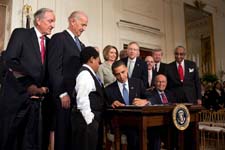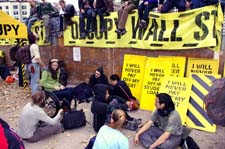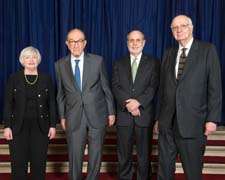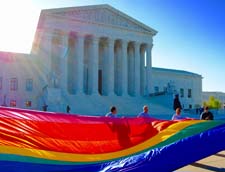

The Timeline highlights significant developments in the history of financial regulation against U.S. and world events. Choose a decade to start, scroll down to read more. Learn more about building the Timeline.

In order to serve increasing numbers of High Frequency Traders, NYSE Euronext opened a colocation facility in Mahwah, New Jersey. Traders using computers next to the NYSE’s servers were able to trade a microsecond ahead of other investors.
On May 6, the Dow Jones Industrial Average dropped nearly 600 points in a few minutes before ending the day down just over 200 points. The event, ultimately believed to be due to use of an algorithm to sell futures contracts, raised concern about the impact of high speed trading on the equities and futures markets. The SEC later approved curbs including trading pauses and circuit breakers and directed exchanges to design a consolidated audit trail.
Congress passed the Dodd-Frank Wall Street Reform and Consumer Protection Act in response to the financial crisis that began in 2008. It granted the federal government new authority to seize and wind down large troubled financial firms, established a council of federal regulators to monitor threats to the financial system, and mandated oversight of the derivatives market. It also gave the PCAOB authority to oversee the auditors of SEC-registered securities broker-dealers. In addition, it permanently exempted non-accelerated filers (more than 5,500 small public companies) from Section 404(b) of the Sarbanes-Oxley Act, requiring an independent auditor to attest to management’s assessment of the effectiveness of the company’s internal control over financial reporting.
The Dodd-Frank Act established the Consumer Financial Protection Bureau to create and enforce new rules governing mortgages and other financial products. President Obama appointed Elizabeth Warren, a Harvard Law School professor with a long track record in consumer advocacy, as a special adviser to set up the bureau; Warren later was elected to the U.S. Senate from Massachusetts. The CFPB offically began its work in July 2011, with Richard Cordray, a former Ohio attorney general, as its first director. In 2016, the U.S. Court of Appeals for the District of Columbia found the CFPB structure unconstitutional, and ordered that the bureau be restructured in line with other independent agencies; the CFPB challenged the ruling.
The Dodd-Frank Act established the Financial Stability Oversight Council to identify and monitor excessive risks to the U.S. financial system, respond to emerging threats to financial stability, and eliminate "too big to fail" expectations. Chaired by the Secretary of the Treasury, voting members included the Federal Reserve Chair, Comptroller of the Currency, Consumer Financial Protection Bureau Director, and chairs of the U.S. Securities and Exchange Commission, Federal Deposit Insurance Corporation and Commodity Futures Trading Commission.
Following the Dodd-Frank Act, the U.S. Securities and Exchange Commission established a Municipal Securities and Public Pension Unit within the Division of Enforcement. The SEC Office of Municipal Securities was restored to independent status.
After the failure of the Reserve Fund in the 2008 financial crisis, the U.S. Securities and Exchange Commission implemented changes to the operation of money market funds, including tighter credit standards, increased transparency and the provision for an orderly liquidation process.

In July, the U.S. Circuit Court of Appeals overturned the 2010 U.S. Securities and Exchange Commission proxy-access rule, requiring shareholders' candidates on corporate boards to be listed on proxy ballots. The court rebuked the SEC for not fully analyzing the economic costs and benefits of the rule.
The U.S. Securities and Exchange Commission appealed a ruling by U.S. District Court Judge Jed Rakoff in rejecting a settlement with Citigroup over the bank's sale of mortgage-backed securities; the assets later defaulted with a loss to investors of nearly $700 million. The SEC claimed that the court was in error in requiring an admission of facts as a prerequisite for approving the settlement, instead of accepting the resolution - used by the SEC since the 1970s - in which the firm would neither admit nor deny wrongdoing. The SEC's settlement was upheld by the U.S. Court of Appeals for the Second Circuit in New York in 2014.
Congress appointed a commission to investigate the causes of the 2008 financial crisis. The commission's report concluded that the crisis was avoidable, and that failures in financial regulation and risk management, along with excessive borrowing, risky investments and lack of transparency, led to the crisis.
As part of the Dodd-Frank Act, the U.S. Securities and Exchange Commission adopted a rule requiring companies to hold a shareholder vote on executive compensation at a minimum of every three years.

Congress passed the Jumpstart Our Business Startups (JOBS) Act, permitting emerging growth companies to raise capital through initial public stock offerings and crowd funding - using social media to reach large numbers of potential investors - exempt from U.S. Securities and Exchange Commission disclosure regulations.
The Stop Trading on Congressional Knowledge (STOCK) Act was approved after a 60 Minutes report that some members of Congress allegedly used insider trading information for personal gain.

The SEC Market Information Data Analytics System went on line, providing regulators with a billion records a day from the proprietary feeds of each equity exchange. The step was considered crucial in regulating increasingly fast and complex markets.
U.S. financial regulatory agencies approved the Volcker Rule, banning proprietary trading and curbing risky trading activities by banks. The rule had been proposed by former Federal Reserve Chairman Paul Volcker as part of the Dodd-Frank Act.
The U.S. Securities and Exchange Commission adopted a "broken-windows" approach in enforcement, modeled on a theory of community policing targeting small problems in an effort to fight crime. The SEC pursued both small legal violations and more serious fraud to foster a culture of compliance.
FINRA approved new disclosure rules for dark pools: platforms run by banks and broker-dealers matching buyers and sellers privately, away from public markets.
NYSE Euronext merged with Intercontinental Exchange, Inc. (ICE), ending the independence of the once-New York Stock Exchange, founded in 1792. Bats Global Markets, Inc. merged with Direct Edge Holdings LLC to form the second-largest U.S. stock exchange operator.

Following a series of high profile technological trading failures, Regulation Systems Compliance and Integrity was adopted to ensure the resiliency of hardware and software at every SRO, exchange, and ATS.
Bitcoin, an independent digital currency, entered into negotiations with the New York Department of Financial Services over the state's proposal to regulate bitcoin businesses, following the bankruptcy of the Mt. Gox bitcoin exchange due to flaws in its software algorithm.
The U.S. Supreme Court ruled that investors in Allen Stanford's Ponzi scheme of up to $7 billion could sue to recoup losses from lawyers, insurance brokers and financial services firms, allowing state lawsuits to proceed. The majority opinion stated that, as the defendents were not selling securities listed on national exchanges, the Securities Litigation Uniform Standards Act (SLUSA) did not pertain.
The U.S. Securities and Exchange Commission approved rules requiring prime money funds for large institutional investors to abandon a fixed $1 share price and float in value similar to other mutual funds, while requiring prime funds sold to individual investors to retain the $1 share price. The rules permitted funds to temporarily block investors from withdrawing cash in times of stress or allow funds to impose fees for investors to redeem shares.
The National Stock Exchange (NSX) resumed trading after closing operations due to low volume. Founded as the Cincinnati Stock Exchange in 1885, the exchange shut its trading floor and became fully electronic in 1980. In late 2016, days prior to NSX's decision to cease operations, the New York Stock Exchange announced its acquisition of NSX.
In its study of secondary market trading in the municipal securities market, the Municipal Securities Rulemaking Board confirmed that price differentials decreased with the introduction of real time reporting.
In U.S. v. Newman, the Second U.S. Circuit Court of Appeals limited tippee insider trading liability, finding that an insider breached fiduciary duty only when disclosing inside information in exchange for personal benefit, and that the tippee knew of such benefit.

Coinbase opened as the first licensed bitcoin exchange in the United States.
On August 24, one-fifth of exchange-traded funds experienced significant price drops at the start of trading, with their overall worth less than their underlying assets. A study by the U.S. Securities and Exchange Commission identified market structure and trading issues, not the characteristics of ETFs, as the cause of the volatility.
Barclays and Credit Suisse, two of the largest operators of dark pools, settled with the U.S. Securities and Exchange Commission and the New York Attorney General on charges that they did not disclose to their customers that their dark pools included high-frequency traders. The firms together paid over $154 million in penalties, the largest penalty to date levied by the SEC against dark pools.
CBOE Holdings, Inc., operator of the Chicago Board Options Exchange, the nation's largest options platform, announced its acquisition of Bats Global Markets, Inc., creating a new global exchange.
The London Stock Exchange Group PLC and Deutsche Boerse AG agreed to merge. In a separate action, Nasdaq bought the options-exchange operator International Securities Exchange from Deutsche Boerse.
The SEC certified the IEX Group, Inc. as an exchange. Opening as an ATS in 2013, IEX attracted investors by utilizing a "speed bump" (imposing a delay of microseconds) to thwart predatory high-speed trading.
The U.S. Department of Labor issued regulations requiring brokers paid to provide investment guidance on certain retirement accounts to act solely in the best interest of the investor.
The U.S. Supreme Court issued an unanimous decision, holding that a tipper's gift of confidential information to a trading family member constituted a sufficient personal benefit to support an insider trading conviction. The Supreme Court invoked its 1983 Dirks v. SEC ruling and narrowed part of the 2014 U.S. v. Newman decision.
The U.S. Court of Appeals for the 10th Circuit ruled that the U.S. Securities and Exchange Commission's process for hiring administrative-law judges violated a clause of the U.S. Constitution governing Presidential and other appointments. The 10th Circuit's decision diverged from an earlier ruling by the U.S. Court of Appeals for the District of Columbia Circuit, which upheld the SEC's use of its in-house courts. The D.C. Circuit's ruling had concluded that judges did not need to be appointed directly by the Commission as the judges' decisions are not final and are subject to Commission review.